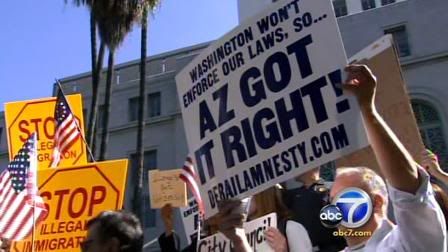 "Compassionate" and "Comprehensive" mean "Amnesty"
"Compassionate" and "Comprehensive" mean "Amnesty"
By Helen Kim Ho
The Asian American Legal Advocacy Center of Georgia wants an end to illegal immigration. AALAC believes the only effective way to solve the problem is through passage of comprehensive, federal immigration reform and not through piecemeal state legislation.
But as an organization that principally focuses on our local community, weíve sought to understand this issue from the perspective of how it would impact regular, hard-working Asian-Americans and others.
State immigration laws like SB 1070 necessitate unconstitutional racial profiling, hurting legal as well as illegal immigrants.
And common sense tells us that when police are trying to develop a ďreasonable suspicionĒ that someone they see walking down the street or driving down the road is illegal, the personís skin color will be one of the first things they see. While the color of a personís skin is evident, a personís citizenship status is not. Imagine being arrested one day because you forgot to carry your naturalization papers proving your citizenship status, and the anger you would feel being treated as a second-class citizen.
My parents came to the United States because they believed America is a country of equal opportunity for those willing to work hard and play by the rules. That ideal is actually part of our Constitution: The 14th Amendment requires states to provide equal protection under the law for all people within its jurisdiction.
A law that authorizes detention of a certain group of people based on race or color goes against the language of our Constitution and the spirit of equal access that brought many of us here.
State immigration laws will create a confusing patchwork of enforcement policies, burdening and exposing local police officers to unfair lawsuits. AALAC believes that requiring our police to act as immigration officials ó a responsibility that is and should be on the federal government ó will create tremendous confusion and cost in implementation among different police agencies.
Already in Arizona, police are dealing with a mishmash of different training materials, policing guidelines and rules based on each agencyís interpretation of SB 1070.
In one county, a police officer is trained to let a driver go with a citation if the officer cannot confirm the driverís legal status while a police officer in another county is trained to send that same driver to border patrol.
And while one officer may decide to detain an individual for speaking English poorly, another officer might decide limited English proficiency is not a reasonable factor in suspecting a personís legal status.
And under SB 1070, the decisions of our police could later be the subject of a citizenís lawsuit, challenging an individual officer for failing to follow procedure ďto the fullest extent of the law.Ē
Patchwork enforcement policies will lead to unfair exposure for police, and could potentially jeopardize the trust and collaboration between the community and the police.
Itís not just a Latino issue. Before Asian-Americans or others feel this is just a Latino issue, letís not forget that discriminatory immigration laws targeting Asians existed for more than 80 years in the United States, starting with the Chinese Exclusion Act of 1882.
And letís also not forget that, in the current day and in our state, we hear of Asian-Americans being discriminated against and targeted based on their ethnicity or lack of English language proficiency.
We canít afford to repeat history, and must come together to promote a reasoned, compassionate and comprehensive answer to our immigration crisis.
Helen Kim Ho is the executive director of the Asian American Legal Advocacy Center of Georgia.
__________________

|